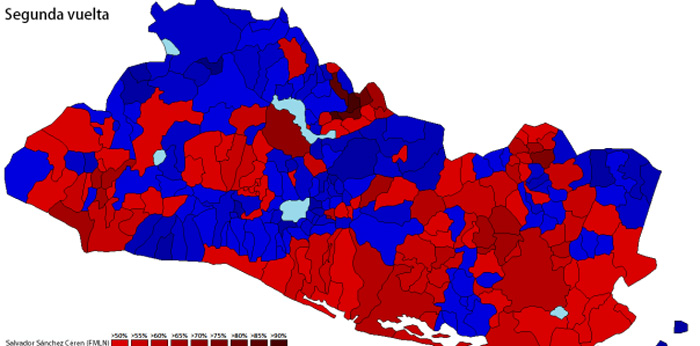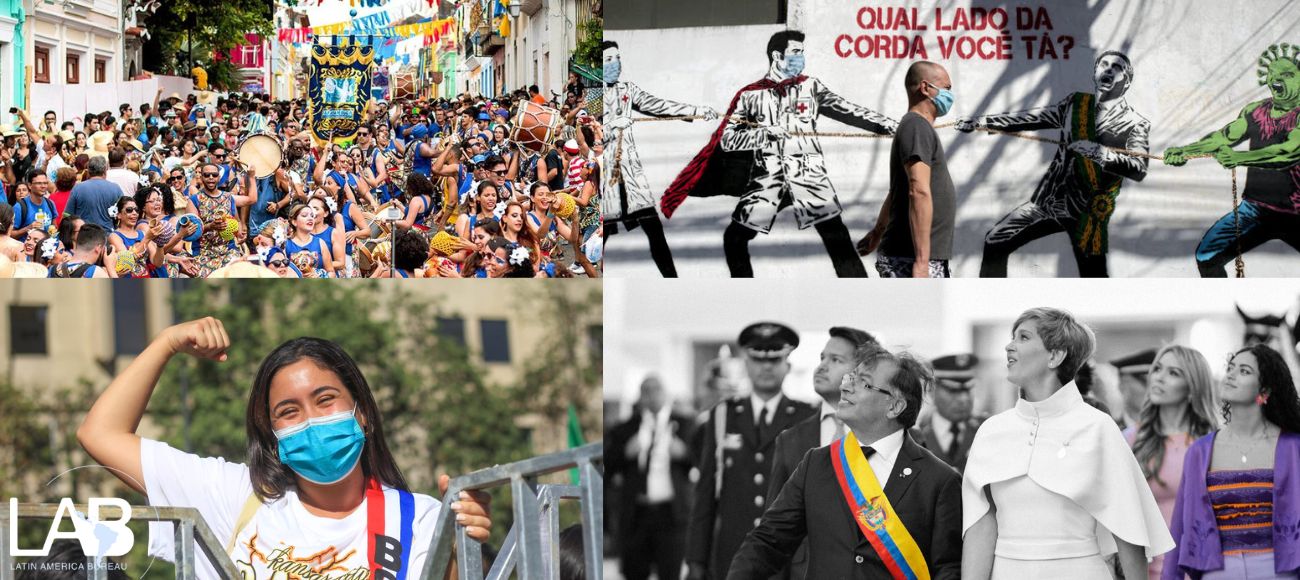Tuesday March 11 2014
No official victor has been declared in El Salvador’s presidential election. At the moment, Sánchez Cerén of the FMLN leads Norman Quijano of ARENA by 6604 votes — 1,494,114 to 1,487,510.
The process of checking each of the 10,445 “actas” or tally sheets on which the votes are recorded in El Salvador’s presidential election
begins this morning. There will be 23 work tables made up of election officials, and representatives of the Attorney General, Human Rights Ombudsman and the political parties.
This is one of those actas which will be reviewed.

I was an election observer in the community of Nahualapa in El Rosario, La Paz, to watch the vote counting which led to the filling out of this specific form, and I can vouch that it was filled out in accordance with the vote count. It is also important to note that the form is signed at the top by the four election officials from the table (two from each party) and by the election monitors from each party in the middle.
The final scrutiny which begins today involves an inspection, not of the individual ballots marked by the voters, but of the actas, to determine if the preliminary vote tally recorded by the TSE matches what is actually recorded on these sheets. The scrutiny uses the original actas, rather than the copies which were scanned and sent by internet to the TSE on Sunday night for the preliminary vote count. The official law governing the final scrutiny is set out in Articles 214 and 215 of the
Electoral Code of El Salvador.
In particular, the TSE
has indicated that there were 14 actas which could not be processed in the preliminary count Sunday night for various reasons including the lack of a proper seal, scratchouts, or inconsistencies. These actas correspond to 3370 votes, not enough to tip the election to ARENA.
You will note that there are two votes listed on the acta above as “impugnados” or disputed on this acta. These are ballots where the officials could not agree if there was a valid vote. Nationwide there were 4191 of these disputed votes. These ballots are segregated from the others, and will be examined by the TSE only if the margin between Quijano and Sánchez Cerén is less than 4191 after re-examining all the acta tally sheets.
I do not know what will be done by the observations on actas like the form above which has an observation that two voters had not signed the signature book recording that they had voted.
In my view, it is quite unlikely that this “final scrutiny” will change the results, and Salvador Sánchez Cerén will be announced as the winner by the TSE. What remains to be seen is how ARENA will react, whether through legal challenges or something else.
Salvador Sanchez Ceren has narrowest lead in preliminary election results
Monday, March 10, 2014
In El Salvador’s presidential election on Sunday, the preliminary victor is Salvador Sánchez Cerén of the left-wing FMLN, but by the slightest of margins, and with a final count of the votes yet to come. Preliminary results are released on the Supreme Electoral Tribunal (“TSE”)
website very quickly after the votes are counted at polling places. Five hours after the polls were closed, 99.8% of the votes had been counted and Salvador Sánchez Cerén of the FMLN had a very slight 6264 vote lead out of almost 3 million votes cast.
Both both parties declared themselves the victors of the election despite the warning by the TSE that no party should claim victory without the pronouncement of the TSE.
What had started as a day filled with what Salvadoran like to call “our great civic fiesta” ended with tension and riot police guarding the facilities of the TSE. Much of the blame for this tension must be placed squarely at the feet of Norman Quijano and his post election speech. Quijano took the stage declaring himself the victor and demanding that the TSE respect the will of the people. Quijano declared that an electoral fraud that kept him from being president would not be allowed to stand. Most concerning of all was his statement that the armed forces were watching the election and were
“ready to make democracy.”
As the night progressed after Quijano’s speech, there were reports that ARENA party members were heading towards the headquarters of the TSE and the Crowne Plaza Hotel where the TSE gives its press conferences and has meetings. Televisions news showed anti-riot police deployed around the Crowne Plaza. I saw extra police out on the streets of San Salvador. It wasn’t what anyone expected when the day started.
There was no doubt that ARENA had pulled off a major turnaround in just 5 weeks from its poor showing in the February 2 first round where Norman Quijano trailed Sánchez Cerén by 10 points, and in opinion polls in the past few weeks trailed by 13 to 18 percentage points. Quijano managed to poll 437,000 more votes than he received on February 2, an increase of more than 40%. In contrast, Sánchez Cerén only increased his vote total by 175,000 votes.
What accounts for ARENA’s surprising showing? A number of theories could be advanced including:
a) The 307 thousand people who voted for former president Tony Saca in the first round went overwhelmingly to Quijano in this round.
b) ARENA’s political vote did a better job of getting out their voters and getting them to the polls. Both parties have impressive logistical operations, which I observed firsthand today, but more ARENA voters showed up.
c) ARENA’s relentless negative campaign in the past 5 weeks worked. The images of recent riots in Venezuela were a central theme of the ARENA campaign to drive a fear of Venezuela style socialism into the electorate.
d) “Null” votes took away from the FMLN. It sounds like as many as 19,000 ballots were marked essentially as “none of the above.”
e) Voter turnout was up, and apparently this helped ARENA.
f) Rumored ARENA fraud inflated its vote totals. I heard such rumors while observing these elections, but it is difficult to image that outright fraud could continue in any significant fashion in El Salvador’s electoral system which most observers say has been free and fair.
This election is not over. El Salvador does not yet have a tradition of gracious losers of close elections.





